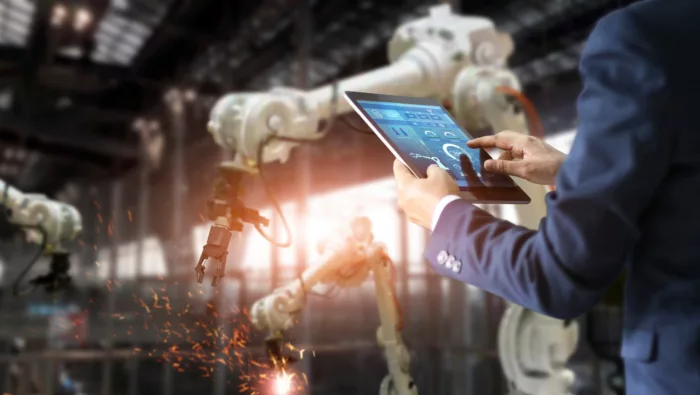
Manager industrial engineer using tablet check and control automation robot arms machine in intelligent factory industrial on real time monitoring system software. Welding roboticts and digital manufacturing operation. Industry 4.0 concept
Ten years ago, two Oxford AI experts predicted that 47% of jobs are at risk of automation. In a new study, they say that while Generative AI has increased the scope of automation further, it will also make many jobs easier to do for people with lower skills.
In their new working paper, Frey and Osborne find that:
- Remote jobs are more likely to be automated, while AI will increase the value of in-person communication skills
- AI hallucinations will continue to be problem, so that firms will mostly keep a human in the loop
- Generative AI is less likely to be deployed in high-stakes contexts, when mistakes are costly or irreversible
- Creative jobs are less prone to automation, but as generative AI makes content creation easier, creative professionals might face more competition and lower wages
In their paper, ‘Generative AI and the Future of Work: A Reappraisal’, Professors Carl-Benedikt Frey, Oxford Internet Institute, and Michael A Osborne, Department of Engineering Science, University of Oxford, provide a reassessment of the division of labour between humans and computers in the age of generative AI and the impact of the technology on the future of work.
The Oxford academics argue that whilst there have been significant advances in AI in recent years, particularly with the growth of Large Language Models (LLMs) like GPT4, significant bottlenecks remain in the deployment of Generative AI technologies which will prevent the complete replacement of humans in the workplace.
Explains lead author Dieter Schwarz Professor of AI & Work, Carl-Benedikt Frey, Oxford Internet Institute:
‘Ten years on from our paper on “The Future of Employment”, we find that key bottlenecks to the automation of social tasks persist. In-person interactions remain valuable, and such real-life interactions cannot be readily substituted by Large Language Models.”
Adds Frey, “As a general rule, it now looks like AI may be able to replace human labour in many virtual settings, meaning that if a task can be done remotely, it can also be potentially automated. Also we find that the more transactional a relationship becomes, the more prone it is to automation.
But without major leaps, longstanding relationships – benefitting from in-person interaction – will remain in the realms of humans’.
Looking specifically at the creative industries, the study finds that whilst generative AI LLMs, such as GPT4, can help turn a ‘poor’ writer into an ‘average’ writer, the algorithm is typically good at generating new combination of existing ideas, rather than making conceptual leaps. The authors find that the deployment of Generative AI in creative work will focus on existing product lines rather than creating new works and won’t be game-changing for creativity.
The study also considered the implication of generative AI on the future of work, in particularly in those situations when algorithms interact with the physical world. The experts find that Generative AI in its current form is less likely to be deployed in higher stakes contexts, like driving, than lower stakes activities such as customer services or warehousing.
Explains co-author Professor Michael A Osborne, Department of Engineering Science, University of Oxford;
‘A key bottleneck to the automation of perception and mobility tasks, particularly in the physical world, is that we can’t accept mistakes. Yet foundation models based on deep neural networks, whose decisions we cannot explain, have the capacity to create plenty of mistakes. For now, deployment of generative AI will be confined to lower stakes activities, like customer service or warehouse automation, where engineers can redesign and simplify the environment to enable automation.
Frey concludes;
“AI will continue to surprise us, and many jobs may be automated. However, in the absence of major breakthroughs, we also expect the bottlenecks we outline in our 2013 paper to continue to constrain our automation possibilities for the foreseeable future.”
The full paper, ‘Generative AI and the Future of Work: A Reappraisal’ by Professor Carl-Benedikt Frey, Oxford Internet Institute, University of Oxford and Professor Michael A Osborne, Department of Engineering Science, University of Oxford is set to be published in the Brown Journal of World Affairs, January 2024.
Media Contact
For a copy of the working paper, interviews and briefings, please contact:
Sara Spinks/Rosalind Pacey, Media and Communications Manager, Oxford Internet Institute 01865 287237 or press@oii.ox.ac.uk.
About the OII
The Oxford Internet Institute (OII) is a multidisciplinary research and teaching department of the University of Oxford, dedicated to the social science of the Internet. Drawing from many different disciplines, the OII works to understand how individual and collective behaviour online shapes our social, economic and political world. Since its founding in 2001, research from the OII has had a significant impact on policy debate, formulation and implementation around the globe, as well as a secondary impact on people’s wellbeing, safety and understanding. Drawing on many different disciplines, the OII takes a combined approach to tackling society’s big questions, with the aim of positively shaping the development of the digital world for the public good. https://www.oii.ox.ac.uk/



